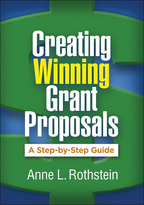Creating Winning Grant Proposals
A Step-by-Step Guide
Anne L. Rothstein
“This book provides invaluable guidelines for all aspects of writing successful grant proposals. It is clearly organized and easy to use. Chapters cover critical topics related to preparing for a proposal, putting together specific elements, and understanding how proposals are scored. Appendices provide additional resources such as examples and web resources. Aspiring and seasoned grant writers alike will find Rothstein's practical advice useful, refreshing, and insightful. Simply put, this book is a gem.”
—Kim T. Mueser, PhD, Department of Occupational Therapy, Department of Psychological and Brain Sciences, and Center for Psychiatric Rehabilitation, Boston University
“Rothstein provides a thoughtful and comprehensive guide to what she terms the 'process approach.' The book describes important general principles of grant writing and details the elements that need to be included in proposals. This book will be beneficial to graduate students and early-career professionals, as well as more seasoned grant writers seeking to develop their skill sets. Rothstein draws on extensive experience to deliver an accessible, useful book that will quickly become a favorite reference in the field.”
—Jason J. Burrow-Sanchez, PhD, Department of Educational Psychology, University of Utah
“This book offers an innovative blueprint for navigating the often challenging and complex grant world. From federal to private funding sponsors, the book provides a practical approach to securing extramural funding. Rothstein shares her proven formula that has resulted in millions of dollars of grant support. Her knowledge and insight help the reader develop a grant-writing skill set and use pragmatic steps to approach the task.”
—Saeedah Hickman, MA, Assistant Dean of Finance and Administration, School of Health Technology and Management, Stony Brook University
“Writing grant proposals can be an intimidating process for students because of the complicated dance of developing ideas within the constraints of regulations and guidelines. This book is an excellent resource to instruct students about the skills and knowledge necessary to develop grants successfully. It offers practical suggestions with many valuable examples of how to present programs in clear, impactful ways.”
—David Lotempio, MA, Instructor, Social Sciences Interdisciplinary Degree Programs, University at Buffalo, State University of New York
“This very useful book provides a detailed explanation of how to navigate each sequential step of the grant-writing process. Following these guidelines will demystify grant writing, leading to successful proposal writing that garners the financial support needed to solve problems and change lives.”
—Vicki Jozefowicz, EdD, Chief Administrative Officer, Kentucky River Foothills Development Council
Table of Contents
I. Preparing for the Proposal
1. The Process Approach: How and Why 
2. Elements of the Planning Process
3. Collaborative and Interdisciplinary Approaches
4. Broadening, then Focusing Your Project
5. Finding Funding
II. Elements of the Proposal
6. The Master Table and Creating Subtables
7. Narrative Summary of Proposal Elements
8. Preparing the Abstract and Introduction
9. An In-Depth Look at Logic Models
10. Establishing Need for the Project
11. Project Goals and Objectives
12. Plan of Operation
13. Evaluation
14. Budget and Budget Narrative
III. Additional Considerations
15. Dissemination, Sustainability, and Significance
16. Addressing Invitational and Competitive Priorities
17. Guide to Proposal Review and Scoring
18. Next Steps
Practice Exercises
Forms
Glossary
Appendices
References
Index
